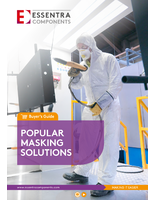ASTM Publication looks at radiation effects on nuclear materials.
Press Release Summary:
Available in print or as e-book, STP 1547, Effects of Radiation on Nuclear Materials: 25th Volume, compiles 17 peer-reviewed papers that focus on research pertaining to effects of radiation on nuclear materials. Sections cover reactor pressure vessel steels; synergistic effects of helium and displacement damage; austenitic steels, Ni, Zr, and Al-Mg alloys, and polyethylene; as well as modeling of radiation effects.
Original Press Release:
Effects of Radiation on Nuclear Materials Now Available from ASTM International
W. CONSHOHOCKEN, Pa.–STP 1547, Effects of Radiation on Nuclear Materials: 25th Volume, is now available from ASTM International.
The compilation features 17 peer-reviewed papers that focus on the latest research on the effects of radiation on nuclear materials, including:
• Light water reactor sustainability issues and programs that address the multiple challenges of extended reactor life, including detailed coverage of irradiation embrittlement of reactor pressure vessel steels; and
• Synergistic effects of gas atoms (i.e. helium and hydrogen) and displacement damage, with an emphasis on the unprecedented challenge to structural and plasma-facing materials in nuclear fusion reactors.
Sections in STP 1547 cover:
• Reactor pressure vessel steels;
• Synergistic effects of helium and displacement damage;
• Austenitic steels, Ni, Zr, and Al-Mg alloys and polyethylene; and
• Modeling of radiation effects.
STP 1547, Effects of Radiation on Nuclear Materials: 25th Volume, is available for $105 USD in print (304 pages; 6” x 9” soft cover; ISBN: 978-0-8031-7533-4; Stock # STP1547) or as an e-book (ISBN: 978-0-8031-7563-1; Stock # STP1547-EB).
To purchase ASTM publications, search by stock number on the ASTM Web site (www.astm.org), or contact ASTM Customer Relations (phone: 877-909-ASTM; sales@astm.org).
ASTM International is one of the largest international standards development and delivery systems in the world. ASTM International meets the World Trade Organization (WTO) principles for the development of international standards: coherence, consensus, development dimension, effectiveness, impartiality, openness, relevance and transparency. ASTM standards are accepted and used in research and development, product testing, quality systems and commercial transactions.
ASTM Staff Contact: Marsha Firman, Phone: 610-832-9612; mfirman@astm.org




